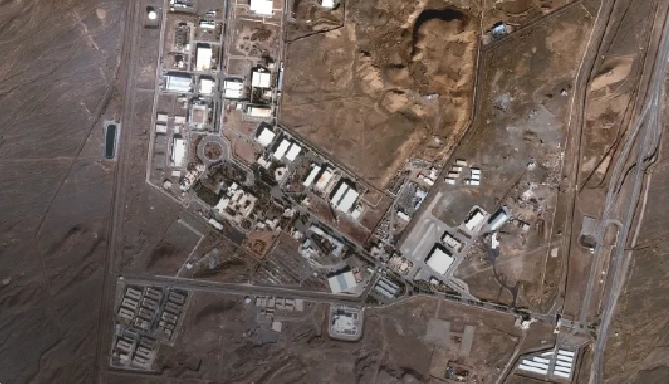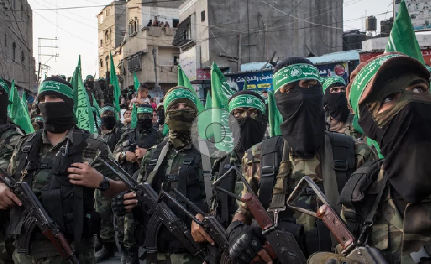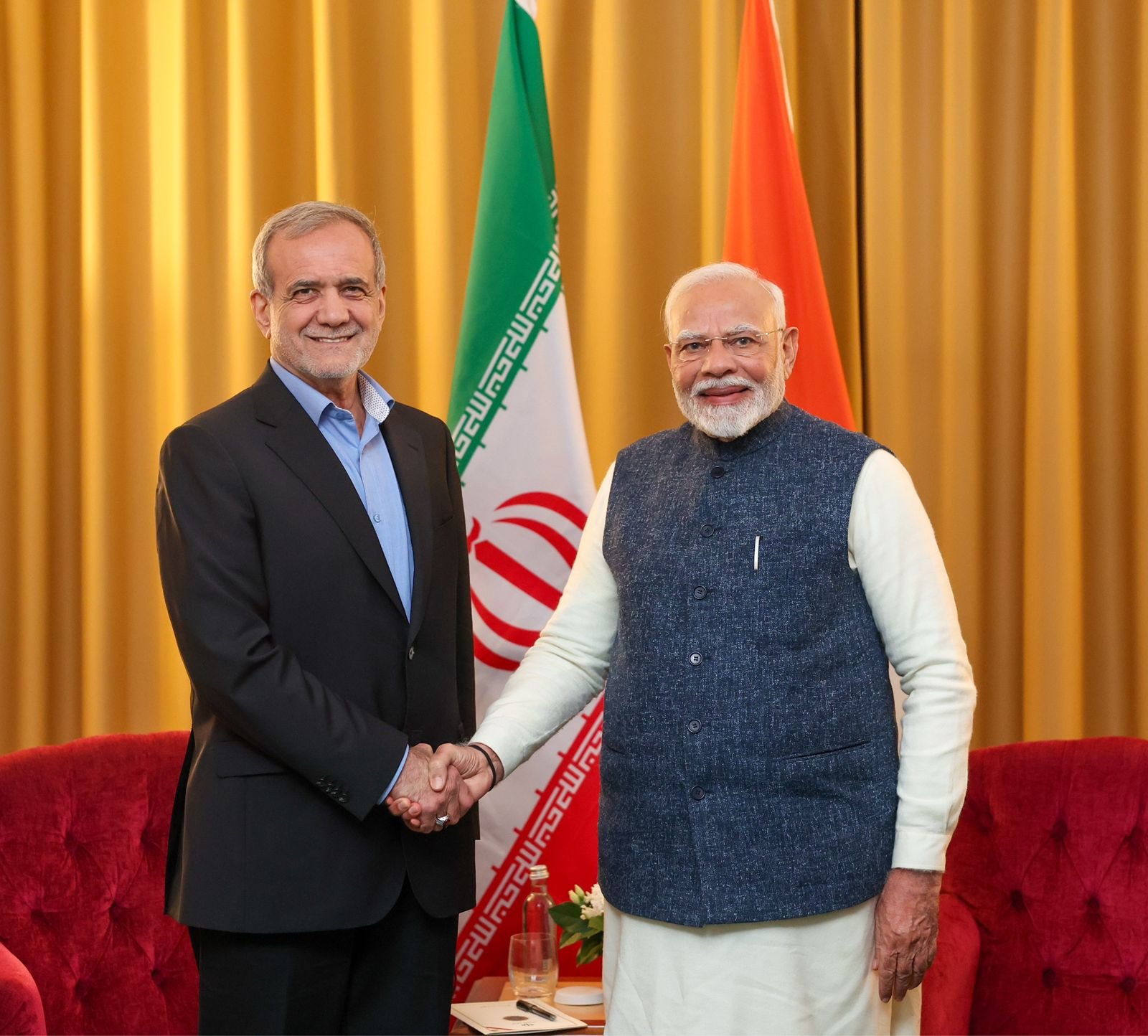India’s Tightrope Diplomacy
India, a rising voice of the Global South, naturally considers utilizing its position as a potential mediator in the Middle East's prevailing uncertainties, specifically the latest Iran-Israel war, given its strong bilateral ties with both axes. This highlights the importance of checking chances for diplomacy to de-escalate current atrocities.current atrocities.
The Middle East is teetering on the edge. What was once a simmering rivalry between Israel and Iran has erupted into direct military confrontations, sparking global fears of a wider, devastating conflict. At the core of this terrifying escalation lies Israel’s unwavering conviction that Iran’s nuclear ambitions pose an “existential threat.” This profound fear underpins a security doctrine that seemingly permits actions without consequence, extending beyond mere defense to encompass unsettling objectives, including the aspiration for complete “regime change” in Tehran. Meanwhile, Iran, a signatory to the Nuclear Non-Proliferation Treaty (NPT), insists its nuclear program is solely for peaceful purposes, even as its uranium enrichment to 60% remains a deep international concern.
In this escalating drama, the world’s gaze has turned to India, a nation uniquely positioned to bridge the chasm. India’s diplomatic fabric is intricately woven with deep historical and cultural ties to Iran a bond forged over centuries and reinforced by crucial diplomatic support, like Iran’s aid to India at the UN in 1994, and ongoing strategic ventures such as the vital Chabahar port. Yet, simultaneously, India nurtures robust strategic and economic partnerships with Israel, standing as its largest weapons buyer. This delicate dance of dual relationships has ignited global hope that India might step forward as a pivotal mediator, a beacon of de-escalation in a darkening world.
However, India’s path is fraught with significant diplomatic and strategic hurdles. Its cautious approach, evident in its measured silence and distancing from multilateral condemnations of Israel, reflects a pragmatic foreign policy that prioritizes its own strategic autonomy and economic interests above traditional ideological alignments. While this approach offers flexibility, it also raises poignant questions about its moral authority and practical leverage as a potential peacemaker. True mediation demands not only trust but also the genuine capacity to influence the behavior of conflicting parties, to gently but firmly guide them away from the precipice. The enduring complexity and tragic persistence of this conflict, underscored by the “ongoing genocidal activity” and “citizen deaths along with children to famine deaths” in Gaza, demand a profound re-evaluation of traditional foreign policy, especially for nations like India striving to balance national interests with the profound responsibility of global leadership.
Geopolitical Overview and Recent Escalations
The long-standing rivalry between Israel and Iran has escalated into direct military engagements, dramatically increasing regional and international risk.
Israel’s direct attacks on Iranian territory represent an unprecedented escalation, moving the conflict beyond proxy forces. This has caused widespread apprehension globally, raising fears that these actions could trigger a wider conflict, even a “world war.” Such direct engagement bypasses intermediaries, directly implicating sovereign territories and national pride, heightening the risk of miscalculation and unintended consequences. This scenario threatens global energy markets and trade routes, demanding urgent international efforts to prevent further escalation.
At the core of Israel’s aggressive posture is its conviction that Iran’s nuclear program constitutes an “existential threat.” This belief justifies its preemptive actions. This narrative is notably asymmetric, as Israel itself is widely believed to possess undeclared nuclear weapons, providing it a unique strategic advantage. Iran, an NPT signatory, claims its program is peaceful, but its 60% uranium enrichment fuels international concern. This enrichment level, while not weapons-grade, significantly shortens “breakout time.” This technical advancement and perceived lack of transparency intensify anxieties. The “existential threat” framing for Iran’s nuclear program serves as Israel’s strategic justification, potentially masking broader geopolitical objectives like “regime change” in Tehran.
Iran’s official position aligns with its NPT status, asserting its right to peaceful nuclear energy while committed to non-proliferation. Despite this, IAEA concerns about its activities, particularly 60% enrichment, persist, revolving around transparency and rapid advancements, creating tension between Iran’s stated intentions and international verification.
The discourse on Iran’s nuclear ambitions is complicated by conflicting narratives and political rhetoric. The shifting stances of influential figures like Tulsi Gabbard (from denying Iran’s weapon development to aligning with Donald Trump’s assertions) illustrate how political pronouncements can shape public and expert opinion, regardless of objective facts. This divergence erodes trust, making common ground for de-escalation elusive and hindering effective diplomacy and IAEA’s vital work.
Key Actors and Their Perspectives
Understanding the motivations and doctrines of key actors is crucial to grasping the Israel-Iran conflict. Their objectives profoundly influence regional stability.
Ori Goldbug views Israel’s “security” doctrine not merely as a response to threats but as a driver of provocations. He describes it as a philosophy granting Israel the right to “kill whoever and wherever and whenever it wants without paying any price for actions.” This unilateral approach, extending its reach from Gaza to Yemen, Lebanon, and Syria, suggests a proactive and offensive posture. Israel’s primary motivation appears to be an active pursuit of regional dominance and elimination of adversaries through preemptive strikes. This aggressive stance is further underpinned by its status as the only nuclear power in the Middle East, offering a strategic advantage and perhaps a dangerous sense of impunity.
Goldbug also suggests “regime change” in Tehran is a probable cause for Israel’s actions, a goal openly supported by Prime Minister Netanyahu. This objective parallels Israel’s strategy in Gaza, aiming to “starve and exterminate the Palestinians... they would rise against Hamas.” This reveals a maximalist goal beyond mere defensive measures, seeking to reshape regional power through coercive means, making de-escalation incredibly difficult. Pursuing regime change in a sovereign nation is contentious and destabilizing, often leading to prolonged conflict and immense human suffering.
International political discourse often shows bewildering rhetoric and contradictory actions. Donald Trump, for instance, portrayed himself as a peacemaker while his administration authorized devastating attacks on Iranian nuclear facilities. This disconnect highlights a troubling politicization of foreign policy, where public image diverges sharply from actual engagement, complicating international understanding and eroding trust. Similarly, Tulsi Gabbard’s shifting stance on Iran’s nuclear program demonstrates narrative manipulation. When political rhetoric dictates opinion, it undermines fact-based diplomacy, making negotiations difficult due to a lack of shared understanding. The United States, under figures like Trump, has thus played a dual role, claiming peace while escalating tensions.

The ongoing conflict in Gaza is a profound human tragedy with severe humanitarian consequences. Israel has reportedly “disregarded worldwide responses,” including calls for ceasefire and ICC arrest warrants, appearing impervious to global outcry. The situation, described as “ongoing genocidal activity” leading to “citizen deaths along with children to famine deaths,” creates a profound moral and political impediment to de-escalation. It fuels anti-Israeli sentiment, making mediation difficult due to questions of impartiality. For mediation to be credible, it needs impartiality and moral authority. Perceived atrocities by one party, if unaddressed, risk mediation efforts being seen as complicit or illegitimate, particularly by regional actors and global public opinion. The Gaza crisis is a constant, agonizing reminder of human cost and an almost insurmountable obstacle to diplomatic resolution, poisoning trust. Iran, asserting national sovereignty, maintains its peaceful nuclear program as an NPT signatory, resisting external pressure. This stance is seen as defense against Western hegemony and a means to assert regional influence.
India’s Position: A Potential Mediator?
India, with its unique geopolitical standing and strong relationships with both Iran and Israel, is widely recognized as a potential mediator.
India and Iran share a rich history rooted in “cultural and long-standing friendship and civilizational backgrounds,” fostering mutual understanding and trust. Iran’s crucial support for India at the UN in 1994 and India’s development of the Chabahar port (a vital “gateway for its exports to Central Asia,” bypassing Pakistan) underscore deep economic and strategic ties. These multifaceted bonds provide India inherent trust and persuasive power crucial for facilitating dialogue where others might lack it.
Concurrently, India has cultivated a robust and rapidly growing strategic partnership with Israel. They share a “close connection” marked by “strategic and bilateral relationships.” Israel is a “key partner” in defense, agriculture, science, and technology. India is “Israel’s largest weapon buyer,” underscoring substantial economic and strategic dependency, providing Israel an incentive to maintain positive relations. This extensive defense cooperation, including advanced weaponry and joint projects, solidifies their alignment.
This dual relationship deep historical and cultural ties with Iran, coupled with vital strategic and economic partnerships with Israel positions India uniquely. However, it also presents a significant diplomatic tightrope. For India to mediate, it must navigate this strong bond with Israel while leveraging historical ties with Iran. Any perceived bias could jeopardize critical strategic interests, making mediation a high-stakes endeavor requiring extreme diplomatic finesse. India’s ability to maintain these seemingly contradictory relationships testifies to its pragmatic foreign policy, highlighting the delicate balance required for effective mediation.
India is widely “expected to and viewed as the most suitable mediator,” with “Everyone looking to India for one mediator position.” Defense expert Praful Bakshi “emphasized the critical role India could play in helping de-escalate the ongoing conflict.” This expectation stems from India’s balanced relationships, making it appear capable of credible and impartial engagement.
However, this expectation places pressure on India’s traditional non-aligned foreign policy, which prioritizes strategic autonomy. Active mediation in a high-stakes conflict demands a more assertive and potentially risk-taking diplomatic posture, which could be seen as taking a stance, a departure from its comfort zone. This creates a fundamental tension between India’s traditional approach and the international community’s desire for it to assume a prominent global leadership role, requiring a strategic re-evaluation of its foreign policy identity.
Challenges to India’s Mediation Efforts
India faces considerable challenges in assuming an effective mediation role, stemming from its complex foreign policy balancing act and the inherent nature of high-stakes diplomacy.
A significant challenge to India’s perceived neutrality lies in its recent diplomatic posture. India “distanced itself from the Shanghai Cooperation Organization (SCO)’s condemnation of Israel’s ongoing attacks on Iran.” This signals a cautious approach prioritizing bilateral ties with Israel. Iranian diplomat Hosseini noted “expectations have eroded,” implying disappointment from Tehran. This pragmatic choice, while safeguarding interests with Israel, compromises India’s perceived neutrality. Impartiality is a fundamental prerequisite for building trust in mediation. Abstaining from condemnation can be interpreted as tacit endorsement, eroding essential trust.
India’s core dilemma is balancing vital bilateral ties with Israel and Iran. As D’souza observes, India’s “unique position” necessitates maintaining “defense ties with Israel and economic ties,” crucial for its national development and strategic autonomy. Following Israeli strikes, Union Minister of External Affairs S. Jaishankar conveyed “our deep concern... at the turn of events” to his Iranian counterpart. This diplomatic maneuver reflects India’s attempt to navigate competing interests without overtly condemning Israel.
This is an active, strategic balancing act, not passive neutrality. India engages with both parties to preserve vital interests, demonstrating a pragmatic foreign policy and a shift towards “multi-alignment.” While maximizing strategic flexibility, this approach might dilute its moral authority or perceived impartiality, making it harder to push for resolutions based on universal principles. India’s challenge is to show its pragmatism doesn’t equate to indifference to humanitarian concerns or international law, which could undermine its credibility as a global leader.
Khinuraj Jangid, Director of the Jindal Centre for Israel Studies, articulates a critical challenge: while India has “goodwill,” it “doesn’t have the leverage” to effectively mediate. He stresses that mediation “doesn’t come only from goodwill.” Goodwill fosters dialogue but doesn’t translate into power to compel concessions. Leverage implies tangible capacity to influence parties through economic pressure, security guarantees, or diplomatic incentives. Without it, a mediator’s role is limited to communication, not shaping outcomes. This is a significant hurdle in a conflict with deeply entrenched positions. India’s dilemma is how to acquire this leverage without compromising neutrality, requiring immense diplomatic skill.
India’s foreign policy has historically shown “flexible shifts in stances,” adapting to evolving strategic interests. Its pivot on Iran’s nuclear program (from siding with Iran to opposing it due to “closer connection” with America in 2005-06) illustrates this. This historical context shows India’s foreign policy is highly adaptable and driven by national interest and geopolitical alignments. This implies India’s current cautious approach to mediation is a deliberate, pragmatic choice. It suggests India will prioritize strategic gains (e.g., strong ties with US and Israel) over potentially costly mediation, even if it means sacrificing moral consistency. This flexibility, while beneficial for autonomy, can create uncertainty regarding its long-term commitments and reliability as an advocate for international principles.
India’s Role: Implications and Future Paths
India’s current diplomatic posture in the Israel-Iran conflict has significant implications for its global standing and de-escalation prospects.
India’s cautious approach and measured silence have drawn internal critique. Sonia Gandhi, in The Hindu, argues that New Delhi’s “silence on the devastation of Gaza reflects a disturbing departure from values,” amounting to a “surrender of values.” This suggests domestic pressure for India to align foreign policy with democratic and humanitarian principles, especially given the humanitarian crisis in Gaza.
While pure pragmatism serves immediate interests, this criticism indicates that abandoning humanitarian principles could undermine India’s soft power, moral authority, and long-term aspirations for global leadership. True global leadership often demands a principled stance, not just strategic maneuvering. A pragmatic approach without a strong moral compass risks reputational costs. The balance between strategic pragmatism and principled leadership will define India’s global trajectory.
Potential Pathways for De-escalation
De-escalation offers a glimmer of hope. Possibilities to “de-escalate the conflict worldwide” exist through diplomatic and political avenues. However, this optimism clashes with the “possibility of executing further escalation.” This tension underscores the profound fragility.
The perceived irrationality and self-serving nature of some international actors further complicate de-escalation. Trevor Noah likened Trump’s actions to an “arrogant father sending his children to fight each other,” highlighting leadership that prioritizes personal gain over conflict resolution. This suggests that while technical pathways exist, political will is currently aligned against them. Achieving de-escalation requires fundamentally altering key players’ mindsets, moving from self-serving actions toward genuine commitment to peace and long-term regional stability.
Conclusion and Recommendations for India
The Israel-Iran conflict is a deeply entrenched geopolitical challenge, fueled by Israel's "existential threat" perception and its relentless drive for "regime change" in Tehran, sharply contrasting with Iran's NPT adherence. This highly volatile dynamic, intensified by politicized narratives from influential figures and the severe humanitarian crisis in Gaza, relentlessly erodes trust and legitimacy. India, uniquely positioned with strong dual relationships, is widely seen as a potential mediator, offering a crucial beacon of hope. However, its cautious, pragmatic foreign policy, balancing strategic interests and international expectations, faces significant challenges regarding leverage versus goodwill. To navigate this complex and deeply human-centric landscape and assert its rightful global role, India and the international community must actively pursue concrete pathways toward a more humane and stable future.

Define Mediation Conditions: India must internally clarify precise conditions for active mediation. Moving beyond generalized goodwill, this means rigorously assessing tangible incentives or disincentives it can genuinely offer both sides. Developing a clear, actionable framework with concrete diplomatic, economic, or security tools is essential for effective and serious mediation attempts to achieve lasting impact.
Adopt Consistent Humanitarian Stance: To bolster its moral authority and truly embody its global leadership aspirations, India should vocally advocate for international law and human rights, especially concerning the devastating tragedy in Gaza. This principled approach, even if causing diplomatic friction, powerfully enhances legitimacy crucial for effective mediation and its global standing, demonstrating unwavering commitment to universal values.
Actively Engage with Multilateral Platforms: While maintaining robust bilateral ties, India should actively re-engage with platforms like the Shanghai Cooperation Organization (SCO). Leveraging these forums can build crucial international consensus, amplify calls for peace, and reinforce adherence to international law, positioning India as a powerful voice for reason and stability.
Initiate Regional Stability Dialogues: India should consider initiating or actively participating in broader regional stability dialogues addressing underlying security doctrines, such as Israel's expansive "security" definition and unsettling calls for "regime change" in Tehran. De-escalating immediate tensions is crucial, but comprehensive approaches are needed to tackle causes of instability. This fosters a sustainable and humane peace framework for the Middle East, prioritizing human lives above all else.

